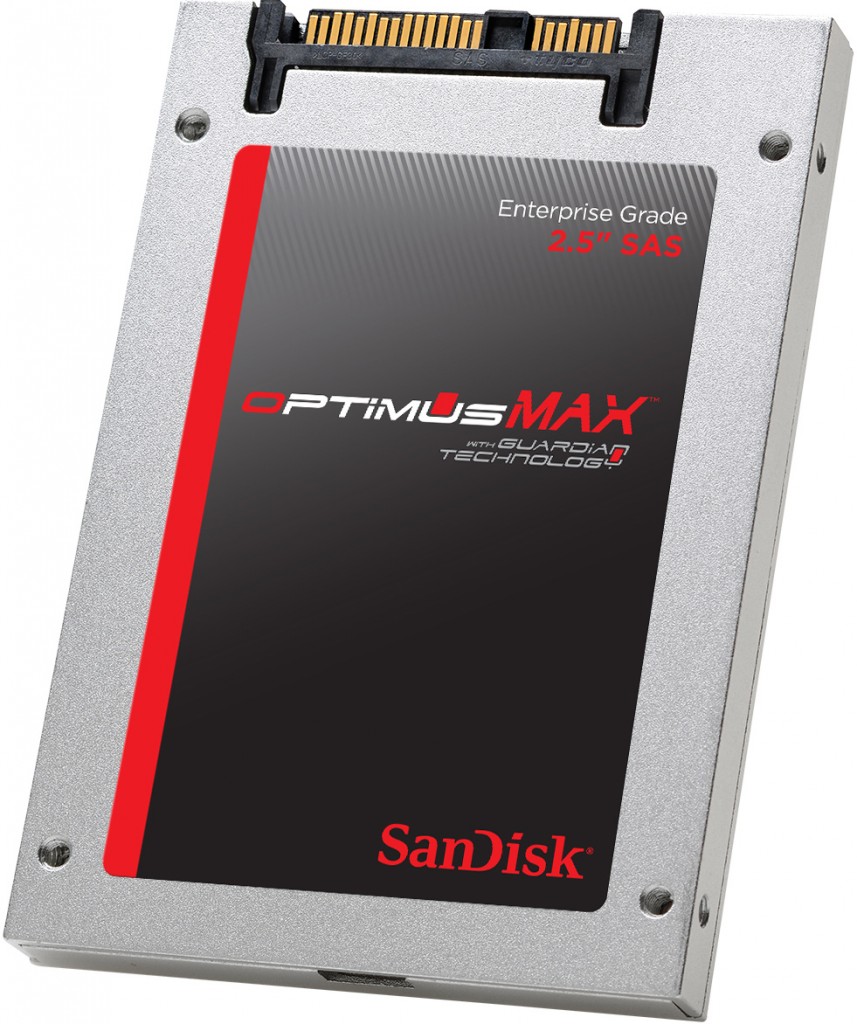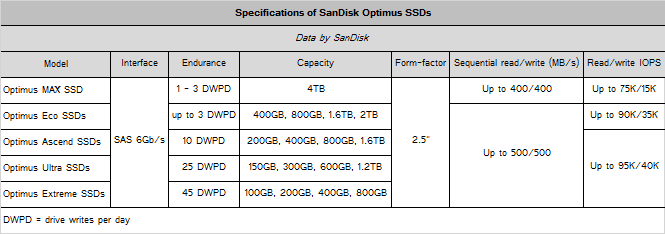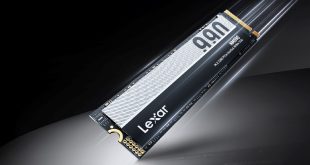SanDisk Corp. on Wednesday announced a new solid-state drive designed for enterprises that could change the way storage systems are built today. The new Optimus Max SSD boasts 4TB capacity, high reliability as well as leading-edge performance, the qualities that are crucial for large data-centers.
Nowadays data-centers use multi-tier storage systems that include large-capacity hard disk drives to keep data that is not needed often, high-performance hard disk drives with 10K or 15K rpm spindle speed for mission-critical data that requires both storage space and performance as well as solid-state drives for data that is accessed frequently. As the amounts of data grow in general, larger SSDs are needed to store “hot” data and higher performance is required for solutions that store “mission critical” and sometimes even “cold” data.
The Optimus Max SSD offers an alternative – delivering cost-effective, high-density storage with SSD-class performance, allowing enterprises to replace HDDs while leveraging their current SAS storage infrastructures. The Optimus Max provides more storage space than any mission-critical 10K or 15K HDD, while at the same time offering dramatically higher performance as well. Since the new SSD provides better performance and higher-capacity than HDDs, the Optimus Max will help SanDisk customers to lower the amount of racks, power supplies, HBAs and other components of data-centers. Quite naturally, total cost of data-centers’ ownership will also drop.
SanDisk Optimus Max solid-state drive is not a performance champion: it features sequential read/write performance of up to 400MB/s and can perform 75K or 15K random read and write input/output operations per second (IOPS). It joins other drives in the Optimus family that provide capacities between 100GB and 2TB. The whole Optimus family is based on 19nm MLC NAND flash memory.
All SanDisk Optimus drives, including the Optimus Max SSD, feature a set of SanDisk technoloties that work in concert to provide a combination of powerful error correction and detection technology, full data path protection, and data fail recovery from lower cost MLC flash.
It is noteworthy that the Optimus Max SSDs are rated for only one – three drive writes per day, hence, it cannot be used for “hot” data that is overwritten multiple times per day. For “hot” data SanDisk’s customers will have to use high-end SSDs.
“Currently, SSDs are used to accentuate high-capacity HDDs in traditional enterprise, cloud and hyperscale data centers, however, increasing numbers of IT managers are finding that they need accelerated performance,” said Laura DuBois, Program Vice President for IDC's Storage practice. “As SSDs, such as SanDisk’s new Optimus MAX, continue to increase in capacity while achieving greater cost-effectiveness, more enterprises will look to SSDs to replace their legacy HDD infrastructures in order to meet today’s high I/O applications and enterprise workload requirements.” [yframe url='http://www.youtube.com/watch?v=lPrdk0sY1xM']
The Optimus Max SSD and renewed Optimus family of drives will be available with TCG Enterprise Security Subsystem Class compliance to select OEMs and through the channel in Q3 2014. Pricing will vary.
Discuss on our Facebook page, HERE.
KitGuru Says: It will be interesting to see whether owners of data-centers will actually adopt Optimus Max-like SSDs for mission-critical and “cold” data storage. While their benefits in terms of higher performance and lower power consumption are obvious, their pricing will likely be very high. Unfortunately, we will hardly know about that for several quarters since OEMs and data-centers certify and test-drive new hardware solutions before deploying.
 KitGuru KitGuru.net – Tech News | Hardware News | Hardware Reviews | IOS | Mobile | Gaming | Graphics Cards
KitGuru KitGuru.net – Tech News | Hardware News | Hardware Reviews | IOS | Mobile | Gaming | Graphics Cards





Still waiting on affordable 2.5″ drives with a capacity OVER 2TB
It seems they’ve forgotten about all of us lowly everyday home users!!!
they ALL used that awful tsunami as an excuse to double up on pricing
and reduce warranties to increase profit, but NOT quality, across the board.
I agree
What do you need that much storage on a single SSD for home usage for? You’d be much better off in terms of pricing to get a couple of 4 or even 6TB magnetic disks and cache using a couple of 512GB SSDs for performance as well as storage. It’s also going to cost you well half of the cost of even a couple of 2TB SSDs.
48TB and looking to add more data storage. (Hint) £millions in crimes video footage from security cameras all exposing serious crimes covered up by police and courts across my city.
… and losing a multi million business because of corruption…. just for example.. THAT’S WHY!
If it were on Cloud storage it’d be hacked by IBM and accidentally destroyed (IBM run the privatised police not to mention internet hacking and media control)
Ah, I understand now. You’re a conspiracy theorist. Well that explains everything.
dumb response but to be clear I was community leader and exposed police corruption for quarter of a decade before protecting a child assaulted in a riot near cost my life and the police, true to their nature, covered it up at a cost of millions to the taxpayer and it all ended up in the pockets of judges, solicitors, council officials and others of a like minded ilk. Have you NOT NOTICED how little news the now controlled press actually put to print. A Theorist would be ideas and opinions NOT clear evidence including audio and video footage held by myself along with others (such as the mayor of the city and international servers). Time will tell as they say….
But the subject matter at hand is about 2.5″ HDD’s with a capacity above 2TB for use in an 8 drive railway backplane so PLEASE bare this in mind before climbing that corruption-protection tea chest of yours once again!